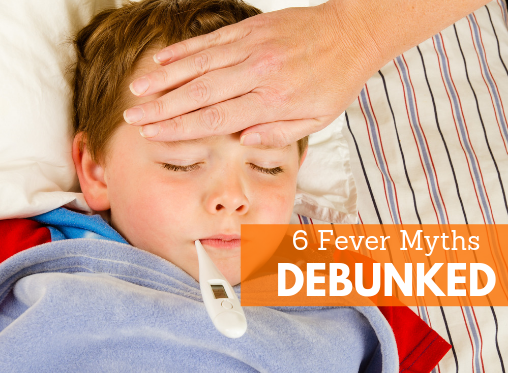6 Fever Myths Debunked
DECEMBER 21, 2018

When your little one comes down with a fever, it’s only natural for you to be concerned. However, there are plenty of misconceptions about fever that can cause you to panic needlessly. So before you worry too much, put your mind at ease with these six debunked fever myths.
Myth: All fevers require medical attention
Fact: A fever is simply the body’s natural reaction to an infection. In fact, fevers are a good sign that the immune system is working properly. Many times, a fever will run its course without any need for medical attention.
Rather than focusing solely on the fever, pay attention to the severity of other signs. If your child is eating, sleeping, and playing normally, then you can usually get by with home treatment. If the fever is accompanied by other symptoms – such as a sore throat, body aches, vomiting, cough, or ear pain – or if it persists for more than 48 hours, call your pediatrician.
Myth: All fevers should be treated with medicine.
Fact: While some parents are quick to give their children fever-reducing medication, it’s actually better to let the fever run its course. Remember, a fever is your body’s way of fighting an infection. If your child is acting fine and seems relatively unbothered, you don’t need to give them any medication.
If the fever rises above 102 or your child is obviously uncomfortable, you can give them some medication to help them rest and feel better. However, the goal is to *treat* the fever, not make it go away completely.
Also, no medicines will actually “break” the fever. The infection will have to run its course no matter what.
Myth: High fever means serious infection
Fact: A normal fever can range anywhere between 100.4 F and 104 F. The exact reading on your thermometer is not a true indicator of how sick your child is. Again, you want to pay attention to how your child looks and feels more than anything else.
Myth: High fevers can cause brain damage
Fact: Fevers from infections do not cause brain damage, even when they get up to the 104 – 106 range. The only time an elevated temperature can cause brain damage is when it reaches above 108 degrees, and this only happens when the air temperature is high – as is the case of children being left in hot cars.
Myth: Any elevated temperature above 98.6 is a fever
Fact: Your child’s temperature fluctuates throughout the day. Just because they may feel warm or have an elevated temp above 98.6 doesn’t mean they have a fever. Actual fever thresholds are as follows:
- 100 F and higher for oral temperature
- 4 and higher for rectal temperature
- 99 F and higher for armpit temperature
Myth: High fevers can cause dangerous seizures.
Fact: Febrile seizures, or seizures caused by fever, only affect about 4% of children. Even then, febrile seizures do not cause permanent harm, nor do they mean your child has a greater risk of developmental or cognitive disabilities.
